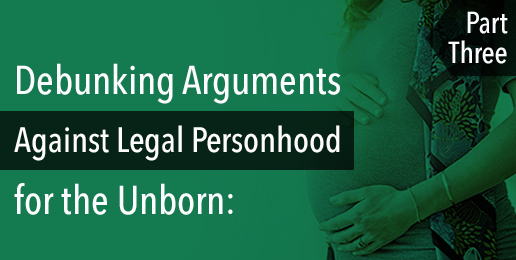
In part 2, we continued working through arguments against legally declaring the unborn to be persons (these arguments come from a Time article published right after Dobbs came down).
For each one, we’ve been showing how it isn’t strong refutation—at least not when up against a consistent pro-lifer. Let’s proceed through just a couple more of these arguments before we wrap up.
Establishing fetal personhood could put people who self-induce abortions at risk for criminal prosecution, says Jolynn Dellinger, a senior lecturing fellow at Duke Law School.
Yes, it would.
And if that became the case, the pro-life movement would finally be consistent. Which is just another way of saying that it would finally believe what it is preaching.
Whether motivated by a concern for public image or other various emasculating considerations, the mainstream pro-life movement has often shied away from endorsing the logical conclusion of its whole position:
If the unborn are people, then killing them is murder, and thus those who kill them should receive legal repercussions.
Now, a HUGE qualification is in order at this point. Saying that “there should be a criminal penalty for abortion” is not the same as saying that “every woman who gets an abortion should be prosecuted.” Even when the law lays down a universal rule, there are always other factors to consider whenever assessing a particular case.
Some women are tragically coerced into getting an abortion. They’ll face literal physical violence from men in their life if they don’t. Legally speaking, you shouldn’t be convicted for a crime you were coerced into committing. (But even that doesn’t remove legal measures from the scene—retribution should then fall on the person doing the coercing.)
So, there shouldn’t be legal repercussions for a woman in that particular situation.
Nevertheless, legal exceptions do not remove legal rules. Other women know what they’re doing—or at least have no plausible excuse for not knowing.
If a woman recognizes that there’s a baby inside her and chooses to kill him of her own accord—and sidewalk counselors can assure you that such women do exist—we can’t help but firmly state that there should be legal repercussions for that.
Refusing to acknowledge this means protecting unborn life with less vigor than born life. And that’s the very thing I thought the pro-life movement was sworn to resist.
So, yes. A resounding yes.
A personhood amendment would make the pill illegal. And praise the Lord when that ever happens, because abortion is quickly moving to this more invisible option—two-thirds of abortions last year were done that way.
[Establishing fetal personhood] could also impact people who miscarry. Leslie J. Reagan, a professor of history at University of Illinois Urbana-Champaign, says prior to Roe, if someone went to the hospital or called a doctor about a miscarriage, they were often questioned on whether they had induced an abortion. . . .
“They were all suspects,” says Reagan.
“[Doctors] couldn’t tell if it was a natural miscarriage or whether they had induced it, and they came to assume that anyone who came in bleeding, miscarrying, had induced it—and began to ask questions.”
I’ll try to address this one with extra sensitivity, because a miscarriage is always a very tragic situation. The last thing a grieving miscarrying woman needs is for a doctor to be questioning her about whether “she did it on purpose.”
Yet, if someone walked into a hospital carrying a dead body, wouldn’t it still be important to find out—using however sensitive a method possible—whether the person carrying the body was involved at all in the death?
This does not mean that you have to “assume” that they did it—everyone is presumed innocent until evidence of guilt surfaces. But I think it is appropriate to find out whether the person most proximate to the death was involved. There are really insensitive ways to do it, for sure.
But that doesn’t mean you shouldn’t try in any way to figure out how a precious human died.
More on “innocent until proven guilty”—this principle makes it very clear that if abortions were prosecuted, it does not mean that all women would be “prosecuted for miscarriages.” (If we prosecute DUI-caused car crashes, that does not mean we prosecute all people who get into car crashes.)
Prosecution for abortion would require not only proof of the baby’s death, but also proof of the intent and action of the mother. In some cases, we would have no way of knowing, and should defer to the mother’s presumed innocence while still grieving the death of the baby.
Now that we’ve addressed several different arguments against a personhood law, let’s take a step back. Notice that none of them address the nature of the unborn.
“If the unborn is considered a person, then we can’t have IVF or certain contraceptives, drink while we’re pregnant, or take abortion pills. And we’ll be questioned if we miscarry.”
None of them discusses whether the unborn is the kind of human that merits the status and protections of personhood.
So none of this has to do with whether the unborn is actually a person! Remember the point I made in part 1 of this series: The rights you enjoy depend on your nature, not on what other people may or may not be able to do because of your status.
Not to be too insensitive, but all these arguments essentially boil down to,
“If the unborn is considered a person, that’ll be really inconvenient for us.”
Something tells me that southern whites were thinking that when they were trying to keep the buses segregated.
Here’s my question: In a debate about unborn personhood laws, shouldn’t we actually talk about the unborn? If they really are people, isn’t it worth wrestling through the inconveniencies and tricky situations for their sake?
Also notice one other thing: There’s a reason I kept responding to various arguments with “Yes, exactly!”
Many of those arguments were simply pointing out the logical conclusion of the anthropological judgment call that we want to enshrine in law. Yet that isn’t a true refutation—it’s just pointing out the logical conclusion of the statement about human nature we believe to be true.
It’s admirable when those who support abortion actually understand the implications of our position. Just think about how we pro-lifers would act if we understood the implications, too. We’d punish those who request and perform abortions.
We’d ban certain contraceptives.
We’d ban IVF as commonly practiced.
I admire those on the pro-abortion side for understanding the implications of unborn personhood.
I wish more pro-lifers did as well.























